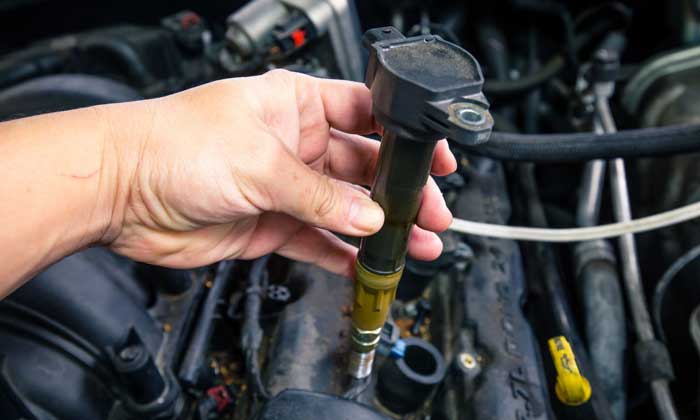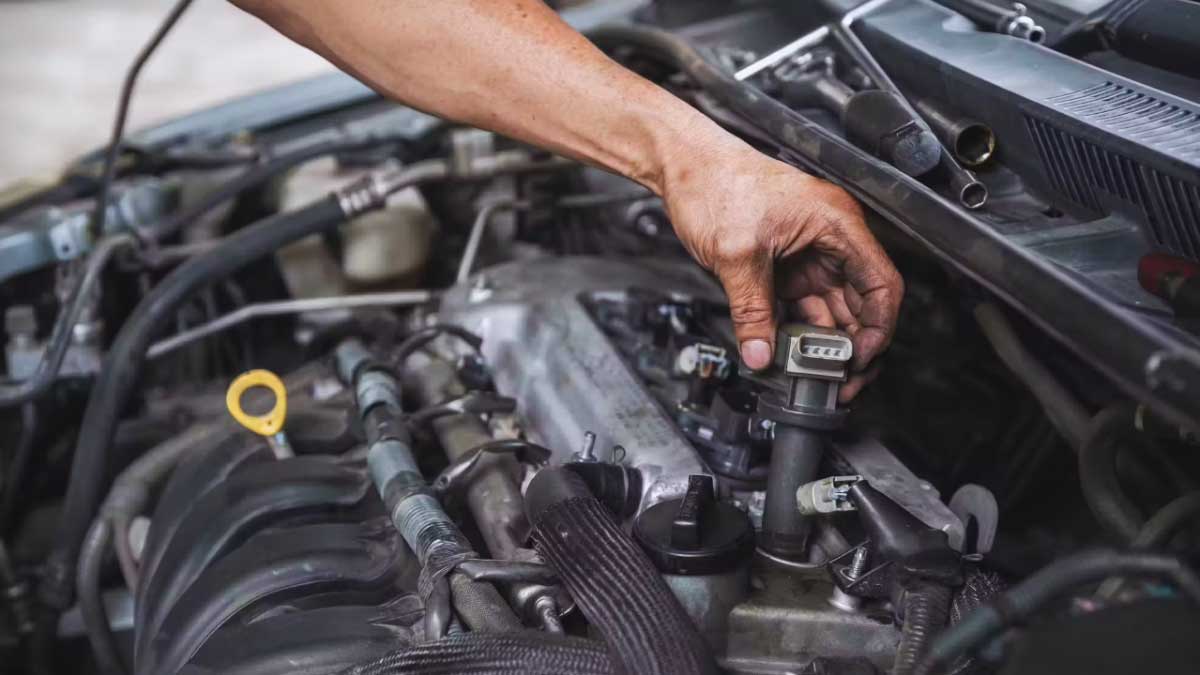So, you’re cruising down the road, feeling like a boss in your trusty vehicle, when suddenly, it starts sputtering like a grumpy old man trying to whistle. What’s the deal? Well, it could be your ignition coils acting up. Now, the burning question arises: should you replace all of them at once or play ignition coil roulette?
Let’s face it, dealing with car troubles is about as fun as a root canal. But hey, I’m here to sprinkle some automotive wisdom on this dilemma. Buckle up, my friends, as we jump into the great ignition coil debate.
Understanding Ignition Coils
Let me break down the mysteries of ignition coils for you, so you’ll be the Beyoncé of automotive knowledge in no time!

How Ignition Coils Function
Ignition coils are like the rockstars of your car’s engine. They take the wimpy battery power and transform it into the high-voltage electricity needed to spark the ignition and get your engine purring like a kitten. Imagine them as the magicians pulling off the ultimate trick to keep your car running smoothly.
Symptoms of a Failing Ignition Coil
When these cool cats start acting up, they send distress signals that even your grandma would notice. Listen to your car when it’s trying to communicate with you. Symptoms of a failing ignition coil include rough idling, engine misfires, poor fuel efficiency, and even the dreaded check engine light deciding to crash your ride’s party.
Now that we’ve deciphered the ignition coil enigma, you’re a step closer to understanding whether replacing all of them at once is the way to go.
Evaluating Ignition Coil Replacement Options
When it comes to tackling the dilemma of dealing with temperamental ignition coils, it’s essential to weigh your options wisely. Let’s jump into the pros and cons of different approaches to replacing these finicky car components.
Pros and Cons of Replacing Only Faulty Coils
Pros:
- Cost-effective: If only one or a few ignition coils are faulty, replacing only the problematic ones can save you some bucks.
- Targeted fix: Addressing specific issues can be like hitting the bullseye in a game of darts – precise and effective.
Cons:
- Future troubles: Ignition coils often age similarly, so if one is failing, its counterparts might not be far behind.
- Repeated labor: If you find yourself under the hood frequently, replacing coils one by one can become a tiresome routine.
Benefits of Changing All Ignition Coils Simultaneously
Benefits:
- Preventive maintenance: Swapping out all the coils at once is like giving your engine a rejuvenating spa day – ensuring smooth sailing ahead.
- Peace of mind: No more fretting about when the next coil will call it quits; replace them all and drive worry-free.
Considerations Based on Mileage and Accessibility
When pondering whether to replace all ignition coils at once, factors like your car’s mileage and the ease of access to the coils play a crucial role. Here’s a quick breakdown to guide your decision-making process:
- High Mileage Vehicles:
- If your car has been around the block a few times, changing all coils can be a proactive measure to maintain performance.
- Aging coils in high-mileage cars can be like old friends – they’ve been through a lot and might need retiring together.
- Accessibility:
- If reaching the ignition coils requires contorting yourself into a pretzel under the hood, it might be more efficient to replace them all while you’re at it.
- Wrestling with coil replacements in tight spaces is a workout even for seasoned DIY enthusiasts – save yourself the trouble and replace them in one go.
By considering these factors and weighing the options, you’ll be able to make a decision that keeps your car purring like a contented kitten on a sunny day.
Factors Influencing Coil Lifespan and Performance
When it comes to your car’s ignition coils, a few key factors can influence how long they last and how well they perform. Let’s jump into the aspects that can impact the lifespan and effectiveness of these vital components:
Impact of Vehicle Age and Mileage
- Vehicle Age: Older vehicles may experience more wear and tear on ignition coils due to prolonged use. As a car ages, the likelihood of coil degradation increases, potentially leading to performance issues.
- Mileage: The number of miles your vehicle has clocked can also influence the condition of the ignition coils. Higher mileage cars may require more frequent coil replacements to maintain optimal performance.
- Driving Habits: Aggressive driving, frequent short trips, or towing heavy loads can put additional strain on ignition coils, reducing their lifespan. It’s essential to drive responsibly to extend the longevity of these components.
- Maintenance: Regular maintenance, including timely tune-ups and inspections, can help identify potential coil issues early on. Neglecting maintenance tasks can lead to premature coil failure and costly repairs.
By considering the impact of vehicle age, mileage, driving habits, and maintenance practices, you can make informed decisions about the replacement of ignition coils. Remember, staying on top of maintenance can help prevent unexpected breakdowns and keep your car running smoothly.
Practical Tips for Replacing Ignition Coils
So, you’re facing the age-old dilemma of dealing with faulty ignition coils in your beloved vehicle. Let’s jump into some practical tips to make this whole coil replacement business a little less of a headache.
When to Consult a Professional
When it comes to tinkering under the hood, consulting a professional is like using training wheels – it just makes things a whole lot smoother. If you’re not exactly a car whisperer, or if your mechanical skills are a bit, well, rusty, it may be wise to call in the experts. Ignition coils are crucial components, and messing with them without knowing what you’re doing can lead to sparks flying – and not the good kind!
Recommendations for Selecting High-Quality Coils
Ah, the quest for the perfect ignition coil – a modern-day treasure hunt for car enthusiasts. When selecting your coils, opt for quality over quantity. Sure, you may be tempted to go for the cheapest option out there, but investing in high-quality coils can save you a ton of trouble in the long run. Look for reputable brands and check for reviews to ensure you’re getting coils that’ll keep your ride purring like a contented kitten.
Conclusion
So, there you have it! Ignition coils can be a real headache, but fear not, my friends. Remember, quality over quantity when it comes to replacing these bad boys. A little investment now can save you a ton of trouble down the road. And hey, if in doubt, don’t be a hero – call in the pros. Keep those coils in check, and you’ll be cruising smoothly without a care in the world. Happy driving, folks!
Frequently Asked Questions
How long do ignition coils typically last?
Ignition coils usually last between 80,000 and 100,000 miles. Watch out for warning signs like a check-engine light or engine misfiring to know when they are failing.
Will installing new ignition coils enhance my car’s performance?
Upgraded ignition coils can potentially boost engine performance by improving throttle response and idling. Consult professionals or the manufacturer’s guidelines for proper compatibility and installation instructions.
Is it possible for ignition coils to last up to 200,000 miles?
Ignition coils can endure anywhere from 100,000 to 180,000 miles, depending on how well the car is maintained.
Should I replace all spark plugs and coils simultaneously?
Ignition coils usually outlast spark plugs and may not need replacement until after 100,000 miles. Evaluate carefully before replacing both at the same time.
Can I drive with a faulty ignition coil?
If a single ignition coil fails, you may not be able to start your car. It could be risky and harmful to drive with a bad coil in a COP setup. It’s best to avoid driving until the issue is fixed.

